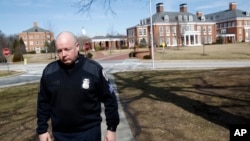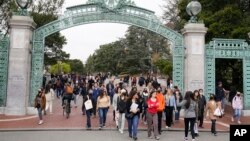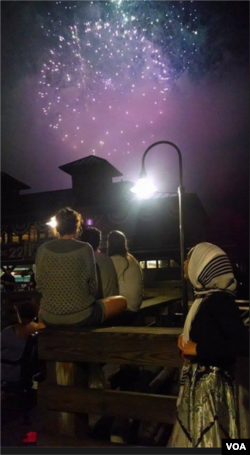Student Union
Students Speak: My U.S. Culture Shock
(Note: A version of this article originally appeared on the Afghan Women's Writing Project website)
I have to say I did not know the meaning of “culture shock” before I came to the U.S, but now I do because I am truly living in a different culture. As an international student coming from a religious and conservative country like Afghanistan to a liberal and democrat country like the U.S definitely shocked my nerves and appetite for a while.
Bikinis at the Beach
At the beginning of my journey to the U.S., mostly general superficial matters grabbed my attention, such as clothing, the ways people spoke, and people’s hairstyles and fashions. For the first time, I was shocked seeing women wearing bikinis in public near the beach. I was not embarrassed watching women in their bikinis because we have women’s public bath houses in my country. But I was embarrassed looking at and talking to the men who were with them, who could and had a live view of 99 percent of women’s naked body. I also think that I might have shocked them as well because I was fully dressed up with my scarf on, walking along the beach.
Mastering Utensils
I still cannot eat rice with a fork properly. For me, eating rice with a fork is frustrating because I hate to see the grains escape from my fork when I am hungry. It is interesting how forks and knives are important in most of the meals in the U.S.; however, I only used a knife for peeling and cutting fruits in Afghanistan.
Manners and Blowing Your Nose
It is polite when sometimes Americans say, “Excuse me!” after yawning or sneezing, but what about when they blow their nose? That was the most funny (and probably most disgusting) culture shock I’ve ever had in the U.S. In my culture it is impolite and disrespectful to blow your nose in front of others. This is not the case in the U.S. Sometimes, it made me laugh when people would blow their nose in public, and remind me of the jokes I heard from my friends when I was child.
Sun Tans & Tattoos
Skin care was another interesting culture shock. Afghans escape from the sun so to not get tanned, but some Americans love to be tanned by the bright sun, even knowing about skin cancer. Tattoos are common in the U.S., but seeing whole body tattoos was shocking to me. What if the design gets boring to them next year? Or what if a man’s wife does not like it?
An Appetite for Reading
Americans like books and enjoy reading books, magazines, newspapers, and other published articles. We can find people reading a book during the day, at night, in the bus or waiting room in the hospital. It was shocking for me to know we can even find books and magazines in many American bathrooms.
Pets as Valued as Humans
Pets, especially dogs, are dear in this country – sometimes dearer and closer than family members. I did not know how hard it is to take care of them, bath them, feed or even play with them! Yes, in the U.S they have vaccinations for their pets; however, we just started the vaccination process for the children in our country and almost half of the people had not ever had a vaccine in their life. This is shocking for me to know in some countries animals are valuable like humans.
Sometimes being in different cultures helps us to know the values and deficiencies of our own culture. People teach us their own living style and we teach them the way we like to live. No one has to follow the others, but the point is to appreciate human beings existence and its uniqueness.
Rahela Mohammad Akbar is a junior at Saint Michael's College, majoring in biology. She has been in the US for five years, and is originally from Herat, Afghanistan.
See all News Updates of the Day
Proposed settlement offered over financial aid allegations

A group of U.S. colleges and universities have agreed to settle a lawsuit alleging deceptive financial aid tactics, according to a report published in The Hill.
The schools would pay $284 million to plaintiffs who were enrolled full-time and received financial aid between 2003 and 2024.
The schools have denied the allegations. (April 2024)
Universities in Middle East building research relationships with China

As China bolsters research relationships with universities in the Middle East, the United States has taken notice – especially when that research involves artificial intelligence.
Reporting for University World News, Yojana Sharma has the story. (March 2024)
Tips for staying safe while studying in the US

Recent news events have raised safety concerns among some international students studying in the United States.
Adarsh Khandelwal, writing in the India Times, has tips for staying safe from the moment you arrive until the day you complete your studies. (March 2024)
Some colleges are making digital literacy classes mandatory

A 2019 study by Stanford found that most college students can’t tell the difference between real and fake news articles. Amid rampant online disinformation, and the threat of AI-generated images, some schools are making students learn “digital literacy” to graduate.
Lauren Coffeey reports for Inside Higher Ed. (March 2024)
With federal student aid delays, students aren’t sure what college will cost

The U.S. Department of Education’s federal student aid form (FAFSA) experienced serious glitches and delays this year.
Now, many students have been admitted to college, but don’t know how much money they’ll need to attend.
Read the story from Susan Svrluga and Danielle Douglas-Gabriel for The Washington Post. (March 2024)







